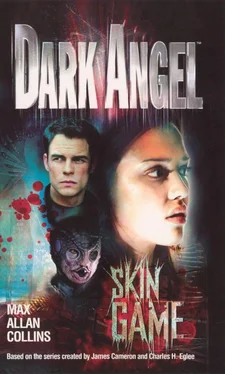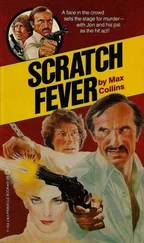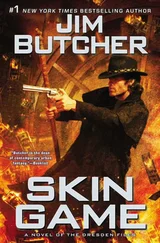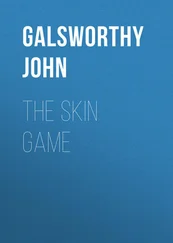On the other hand, the drunks had managed to spread their hatred in a literal manner, prior to Alec spanking them: the fire, courtesy of the one Molotov cocktail that had reached its target, made its way quickly up the wall, and soon the entire building was endangered.
Transgenics showed up, seemingly from nowhere, to fight the blaze with extinguishers and an old-fashioned bucket brigade — losing precious water — and in less than five minutes, the fire was under control at least, which was good news.
Only, news of another kind had also been made: Max had looked helplessly on as the TV crew captured Alec’s attack on the drunks; but the camera also caught the fire, and the teamwork of the transgenics.
As the TV crew was recording the firefighting efforts of her brothers and sisters, Max had a moment of elation at the notion of the media showing something positive about the transgenics; then she noticed how the flames and smoke-streaked air played on those animal-tinged faces: her brothers and sisters, so many of them already condemned by appearances considered freakish by mainstream America, looked distorted, even more monstrous in the eerie lighting provided by the fire.
Max made her decision — she ran toward the fence, alighted atop it, then hopped over and landed in front of the cameraman, who nearly toppled backward when she filled his eyepiece. Stepping forward, she steadied him and in one swift motion ejected the tape and removed it from the camera.
“Hey!” the cameraman yelled.
“It’s her !” somebody said.
Max gave the cameraman a stony stare, and he backed up a few steps.
The reporter with the smoothed-back hair, power tie, and too much cologne stepped forward. “ This is why people hate you transgenics.”
She spun toward him. “Why?”
“You can’t interfere with freedom of the press.”
“Actually,” she said, “ this is why people hate us transgenics.”
And she grabbed him by the front of his cheap suit and, like she was plucking a flower, hauled him five feet off the ground. He looked down at her with terrified eyes in that tanned face, and was whimpering when she set him down again.
“You... you may not look like some of them,” he said, trembling, “but you’re a monster, too...”
“We’re monsters because you make us monsters.” Wheeling around, talking to all of them, she said, “It’s not freedom of the press when you set up a bunch of drunk dipshits to try to firebomb us.”
“How dare you!” the would-be anchorman blurted. “Are you accusing me of manufacturing a story? I never—”
“Save it for the morning news,” Max said. “You’ll need the blather, ’cause you won’t have the footage — I’m taking your tape. And you’re lucky that’s all I’m taking.”
“You can’t—”
“I already did.” She turned and saw that the pudgy cameraman had plopped in a fresh tape and gone back to work, grabbing the tail end of this confrontation. “What’s your name, bud?”
“Bud,” the cameraman said, astonished by her apparent psychic abilities.
“Bud, tell me the truth. Did Wannabe Anchorman here bribe those drunks?”
The cameraman stood stock-still, the lens settled on Max’s face. Finally, he asked, “Do I keep my tape?”
Through his teeth, the anchorman said, “Bud, I will fucking fire your ass.”
“Thanks, Ben,” the cameraman said, “for saying that on camera. The union will love you for it.”
Max smiled. “I think you’ve answered my question, Bud — glad to see there’s some integrity left, in certain corners of the modern media. Thanks.”
She gave them a little one-fingered salute, and jumped back over the fence — like Alec, in one bound — and alighted in her catlike manner. Then she walked slowly toward where the wooden-frame building still burned. In the cool of the predawn morning, the heat of the flames on her face almost felt good, like a blush of pride. She knew Bud was still filming her, but she didn’t give a damn.
Stepping forward, she tossed the tape into the flames.
Other camera crews emerged from the darkness to catch the dying fire on tape too, and she was sure that the anchorman would be spreading lies to his colleagues; but there was nothing she could do about that. Sooner or later she would talk to Clemente and try to explain it to him.
She hoped the detective would not consider her brief excursion over the fence — to defend Terminal City from flames and lies — as a violation of their agreement that she and the other transgenics remain within the boundaries of the toxic nightmare they called home.
Finally, trailing even the newspaper photographers, the police and the Guardsmen came rolling up. They talked to the anchorman with the attitude, and they interviewed Bud as well, and some of them helped up the drunks, who seemed to be coming around, one or two spitting a tooth like a watermelon seed. Glancing over at Alec, Max saw him working at suppressing a smile.
Watching the building burn, Max found memories swirling to the surface of her mind, dark remembrances of that terrible, wonderful night last year when Manticore had burned.
She wanted to think she’d done the right thing that night, freeing her brothers and sisters, even the failed experiments in the basement; but all this trouble — the deaths, from CeCe to the skinning victims — and with so many lost souls to worry about now, she could only wonder if she had done right.
The X5 also wondered if she would ever really know if she had done the world good or ill, or if she would always be haunted by the mantle of leadership and responsibility she had taken on herself.
Max was not alone among the transgenics who were haunted by memories of Manticore. Elsewhere — sleepless in Seattle — Bobby Kawasaki lay in his bed, remembering Max and how they had met and how she had liberated him...
Kelpy had heard the commotion before it got anywhere near him.
The disturbance had started upstairs, and even through the floors and walls he could hear the yelling, the stamping of feet, and — scariest of all — the gunfire. His anxiety level rose, but inside his Plexiglas box, in the middle of the cell, there was nothing to blend in with...
And so he’d stood there, petrified, rocking from one foot to the other. Lately, the doctors kept him in a straitjacket as well, over his clothes, which prevented him from stripping off those garments and trying to blend in on those few occasions they actually let him out of the box.
Joshua — the only one of them down here with anything resembling freedom at all — appeared in the small window in the door.
“It’s going to be okay, Kelpy,” the dog man’s soft, reassuring voice had soothed. “Max is coming... Then we blaze.”
Before Kelpy could respond or ask who this “Max” was, Joshua was gone on to the next door.
Upstairs, the firefight seemed to grow in intensity, and Kelpy — just as he had countless times before — examined the lock mechanism of his Plexiglas prison in hopes of finding a way out. And just like those countless times he’d previously looked at it, he saw a device as cruelly indecipherable to him as the mystery of life.
Kelpy knew he couldn’t have overcome that lock, even if his arms hadn’t been pinned to his sides by the straitjacket.
When he heard the tumult break through the door at the end of the hall, Kelpy gave up and simply sat down, waiting to die, and not really minding the opportunity. Almost within seconds of the basement door bursting open, he could smell smoke. Realizing the building was on fire, Kelpy now actively hoped that one of the guards would step in and shoot him. The quick mercy of that seemed preferable to burning to death, or for that matter, surviving at all.
Читать дальше












